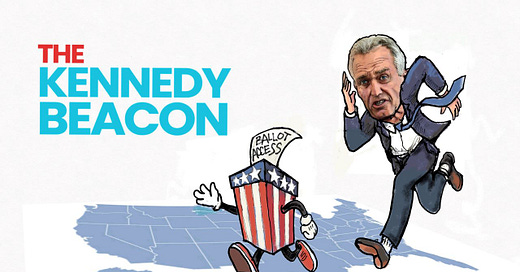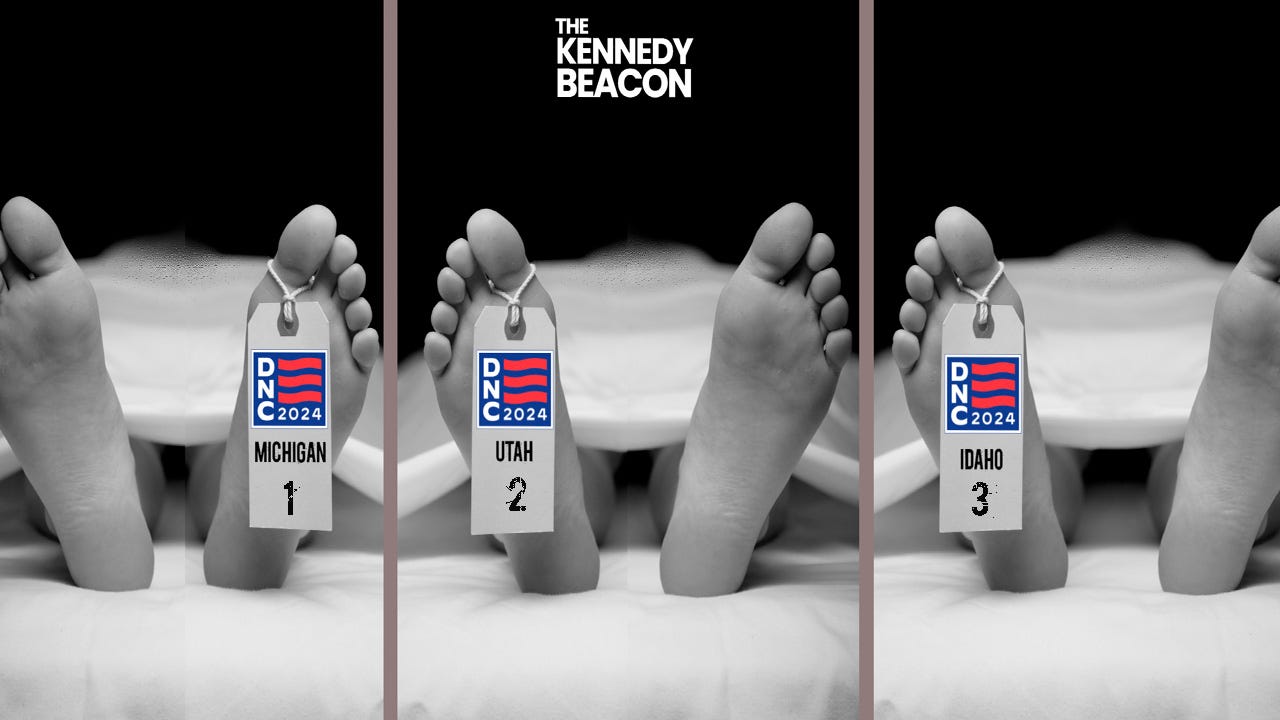By Leah Watson, The Kennedy Beacon
It’s a challenge for an independent candidate to get on the ballot in every state, to say the least. Each state has its own nuanced laws and conditions. While he faces this challenge, Robert F. Kennedy Jr. has the Democratic Party trying to pull the rug out from under him. But he hasn’t let it trip him up.
Kennedy, who recently gained ballot access in Michigan, a major battleground state, has taken on ballot access cases in Utah, Maine, Idaho, and Hawaii. On April 19, he won his first legal fight with the DNC over ballot access against the Democratic Party of Hawaii.
In total, he’s won three out of four of the ballot access cases where he sued.
In Hawaii, Kennedy launched a third party called the We the People Party because parties require fewer signatures than independent candidates to secure a ballot line in that state. (We the People has also launched in Delaware, Mississippi, and North Carolina, states that have similar rules.) On February 23, Team Kennedy announced that the We the People Party had collected the required number of 862 valid signatures, which officially made it a qualified party in the state of Hawaii.
Following this announcement, The Democratic Party of Hawaii filed a complaint against the We the People Party. The complaint did not contest the signatures collected but did try to exploit a technicality within the We the People bylaws requiring that all officers and members of the party must not be members of other political parties.
The Democratic Party of Hawaii claimed that in 2022, two of the officers of the We the People Party, Michael Moskowitz and Susan Alden, voted in the Democratic Party primary and were therefore unsuitable to be officers in the party. The case was dismissed because, according to Ballot Access News, “Hawaii does not have registration by party. Nothing in the election law supports the notion that if someone votes in a party primary, he or she is therefore trapped into being a party member for the infinite future.” The We the People Party is now on the ballot in Hawaii, however, the Democratic Party of Hawaii has 30 days to appeal the decision.
The Democratic Party also accused another member of the party of being ineligible because he was no longer a registered voter in Hawaii. The We the People Party also prevailed against this claim.
This politically motivated litigation initiated by the Democratic party was arguably a waste of time and resources, all in an attempt to throw a wrench into Kennedy’s ballot access push.
Kennedy also won cases in Utah and Idaho, where he succeeded in extending the filing dates for signatures. In both states, Kennedy claimed that the early deadline was unconstitutional based on the large number of valid signatures required. In Utah, a decision was made to move the January 8 deadline to March 5, and in Idaho, the submission deadline was pushed from March 15 to August 1. According to Team Kennedy’s press announcements, Kennedy has recently collected more than enough signatures to qualify in the state of Idaho and he is officially on the ballot in Utah.
The only ballot access-related case in which Kennedy did not prevail was his lawsuit against Maine Secretary of State, Shenna Bellows. As previously reported by The Kennedy Beacon, Kennedy filed a suit against Bellows after she disallowed Team Kennedy to petition and gather signatures at the polls during the Maine presidential primaries, for which Kennedy was not on the ballot. The court ruled in favor of Bellows, who insisted that allowing Team Kennedy to petition at the poll sites might unduly influence voters’ decisions in that primary. However, the court did grant that Team Kennedy can collect signatures outside of the polls on June 11 for the state’s primary election.
As Team Kennedy completes and files more petitions in more states, supporters of Kennedy expect his opponents will attempt more dubious legal maneuvers. Regardless of who wins the presidency, Kennedy’s successful challenges to unconstitutional ballot access laws are a win for democracy: he is improving access for future independent and third-party candidates in those states.






It's astounding and disturbing that RFK, Jr. has to fight for ballot access. He needs to be on every state ballot.
His battles highlight the totalitarian, corrupt and fascist mentality of the Democrat party.
Keep pushing hard on your fight for all of us to have choices